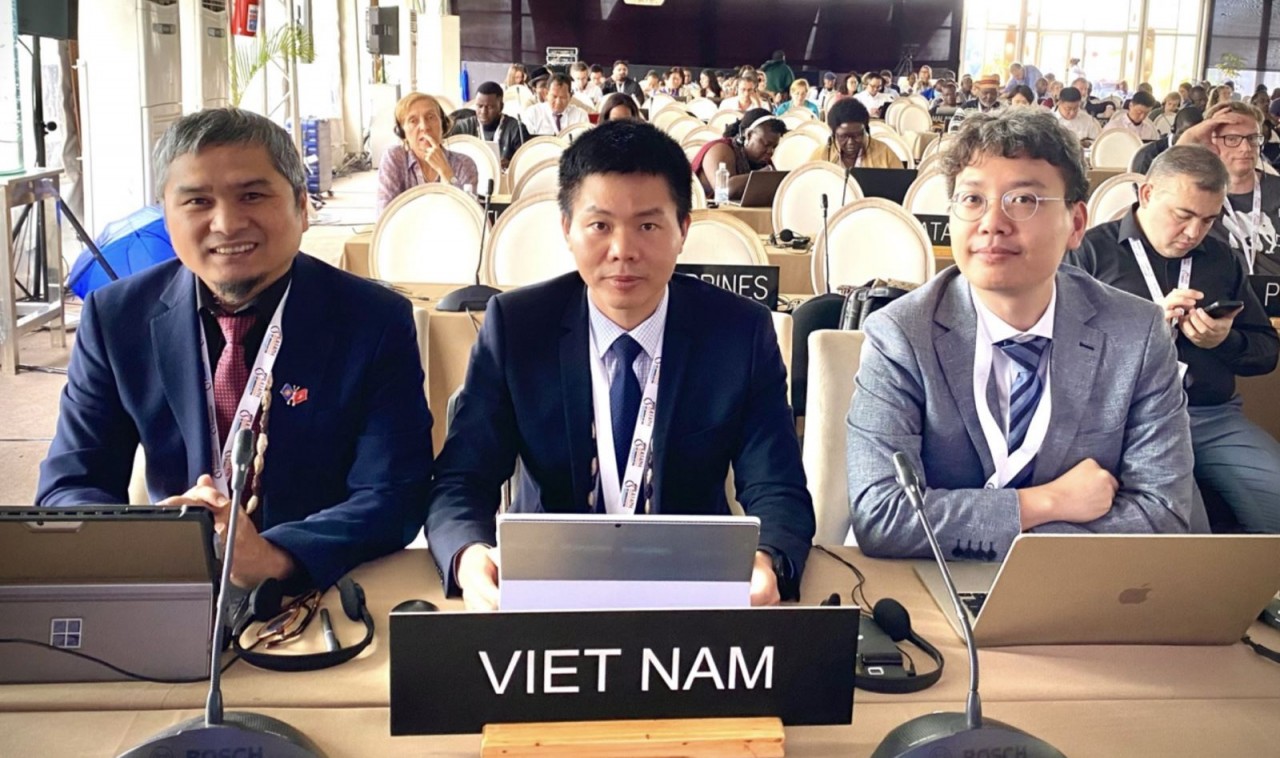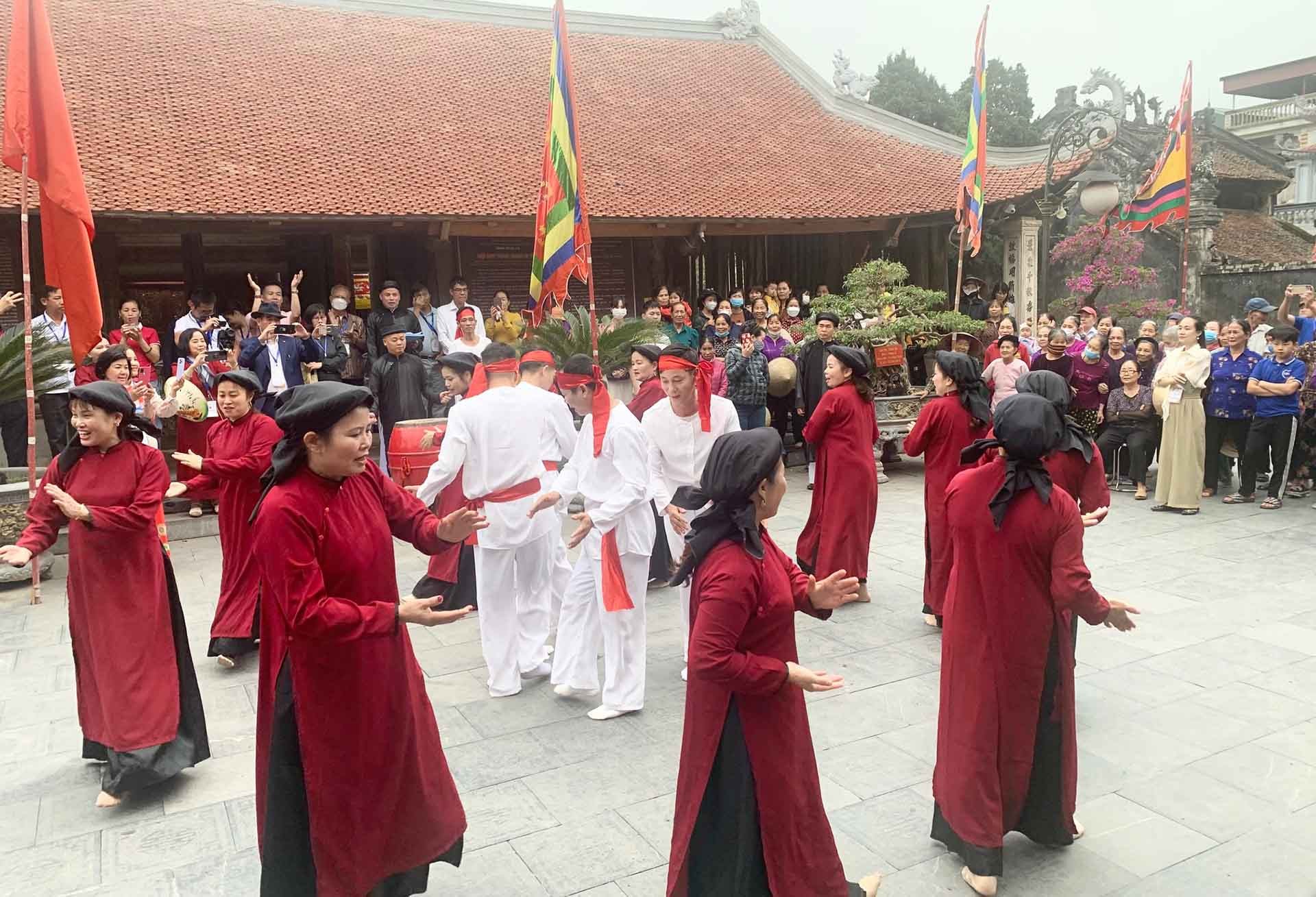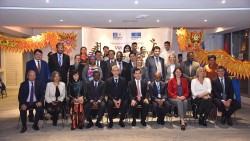
Enhance values of intangible cultural heritage in Vietnam
Latest
 |
| The Vietnamese delegation attended the 18th session of the Intergovernmental Committee of the 2003 Convention. (Photo: The Vietnamese Delegation) |
Within the framework of the 18th Session of the UNESCO’s Intergovernmental Committee for the Safeguarding of the Intangible Cultural Heritage (the 2003 Convention) taking place in Kasane, Boswana, on December 8, Vietnam was elected as Vice Chair of the Committee, representing the Asia-Pacific region. This is the second time Vietnam is a member of the 2003 Convention's executive body, after its first term from 2006-2010.
Affirming increasingly high position and reputation
According to Ambassador Le Thi Hong Van, Head of the Permanent Delegation of Vietnam to UNESCO, the fact that Vietnam was once again trusted to be Vice Chair at one of UNESCO’s key specialized agencies has affirmed its increasingly high position and reputation globally.
This shows the international community’s support and trust in Vietnam’s ability to contribute to and operate at UNESCO, recognizing Vietnam’s positive contributions to cultural cooperation in general and intangible cultural heritage in particular, contributing to promoting the role of culture and heritage for sustainable, inclusive, and resilient development, at the national, regional, and global levels.
This is also evidence for Vietnam’s success in implementing its external policy of multilateralization, diversification, and comprehensive international integration in line with the spirit of the 13th National Party Congress' Resolution, and the Directive of the Party Central Committee’s Secretariat on strengthening and enhancing multilateral diplomacy until 2030.
Attending the Session, Mr. Dao Quyen Truong, Deputy Director-General of the Department of Cultural Diplomacy and UNESCO Affairs said that the Secretariat and members countries of the 2003 Convention highly appreciated Vietnam's policies, strategies, and practical measures in promoting the role of intangible cultural heritage as a driving force for sustainable economic, cultural-social development, environmental protection, and biodiversity protection.
Vietnam's efforts in early researching and integrating many contents of the 2003 Convention into Vietnam's Cultural Heritage Law were highly appreciated internationally, he shared.
As Vice Chair of the Intergovernmental Committee of the 2003 Convention, Vietnam has more favorable conditions in completing and implementing goals and priorities of the 2003 Convention, enhancing the significant role of intangible cultural heritage as a motivation for sustainable development, cultural diversity, creativity and dialogue among cultures, and connecting the society with the increased engagement of the community, women and the youth.
Besides, all 15 UNESCO-recognised intangible cultural heritage and 534 national ones have management, protection, and promotion plans with close community participation and responsibility of all levels of government, becoming a good experience for member countries.
 |
| Xoan singing artists at Hung Lo communal house, Phu Tho. (Photo: Ha Anh) |
Motivation to preserve local heritage
Currently, Vietnam has nearly 70,000 intangible cultural heritages inventoried; including 15 UNESCO-recognised intangible cultural heritage and 534 national ones. Associate Professor. Dr. Le Thi Thu Hien - Director of the Department of Cultural Heritage (Ministry of Culture, Sports and Tourism) said that Vietnam was the first country to request and the Intergovernmental Committee agreed to remove Xoan Singing of Phu Tho province from the list of the world’s intangible cultural heritage in need of urgent protection.
Along with protecting the intangible cultural heritages that have been honored, all levels, sectors and localities in Vietnam are continuing to complete dossiers submitted to UNESCO to register forms such as: Cheo singing art, Mo Muong art, Binh Dinh Traditional Martial Arts, and Vovinam (Vietnamese Way of Martial Arts).
Ms. Hien said that various activities in localities have made important contributions, creating conditions for artisans to regularly maintain and practice heritage, have opportunities to meet and exchange experiences on heritage practices in the community, and raise awareness and responsibility in preserving and promoting heritage values.
Recently, Minister of Culture, Sports and Tourism Nguyen Van Hung signed a decision to announce a list of more than 30 national intangible cultural heritages throughout the North, Central and South regions.
This list continues to be a chance for localities to preserve, promote, and enhance heritage values, motivate people to turn heritage into assets as well as develop tourism products.
At the workshop “Living cultural heritage and sustainable development: From a people-centered approach” held in Hanoi recently, Ms. Dona McGowan, Director of the British Council in Vietnam said with such a treasure trove of intangible cultural heritage, Vietnam needs a strategy to promote the role of cultural heritage in the sustainable development goal, honoring the contributions of the community, as well as affirming their importance and central role.
| The Intergovernmental Committee of the 2003 Convention, consisting of 24 members, is UNESCO’s important agency for safeguarding intangible cultural heritage. Its functions are to decide on key issues related to recognition of intangible cultural heritage, allocate funds to support the preservation of intangible cultural heritage in countries, and decide on development policies and orientations of the 2003 Convention. |

| Russian expert desires to enhance collaboration in cancer treatment with Vietnam Vladimir Moiseenko, Director of the Napalkova cancer centre in St. Petersburg – one of Russia's leading cancer diagnosis and treatment establishments, expressed his interest in ... |

| Thua Thien-Hue: Finding ways to preserve, promote feudal dynasty’s cultural heritage Over the past time, with domestic efforts and international support, the work of preserving Hue's cultural heritage has recorded great achievements. |

| Binh Lieu to win people's hearts with landscapes and cultural values The ethnic minority community in Binh Lieu district in the northeast region of Quang Ninh province has preserved their unique cultural features, from folk songs ... |

| Cultural heritage - A vector for peace, resilience and sustainable development WVR - On November 6, at UNESCO headquarters in Paris, France, the Permanent Delegation of Vietnam to UNESCO and the Vietnam National Committee for UNESCO ... |

| Cultural heritage is a core element in shaping Vietnam tourism brand WVR - Cultural heritage tourism is identified as a leading product line, whereby cultural heritage is a core component in shaping the Vietnam tourism brand. |

















